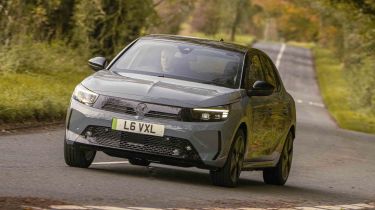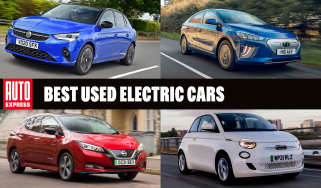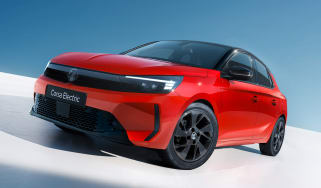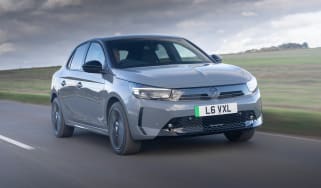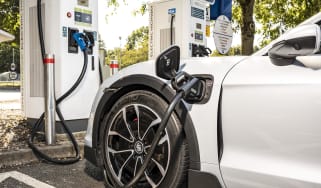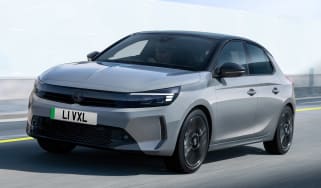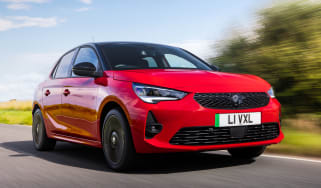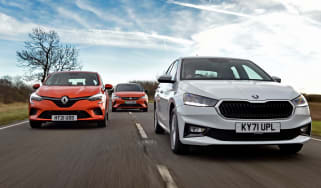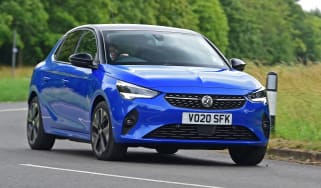Vauxhall Corsa Electric review
The Corsa Electric has decent performance and range, but some versions are better value for money than others

Our opinion on the Vauxhall Corsa Electric
Renaming the Vauxhall Corsa Electric from Corsa-e was perhaps a necessary step to better differentiate this electric car from the rest of the Corsa range, because in a number of ways, you can argue that the Corsa Electric is better than the original, given it has additional refinement and much more perky performance compared with the regular Corsa.
Certain buyers will appreciate how ‘normal’ it looks and feels – ideal for anyone nervous about driving an EV for the first time. Others will be charmed by how easy it is to drive, the real-world range of more than 200 miles, and its nippy performance. Pricing has been adjusted numerous times to bring the Corsa Electric more into line with a raft of newer supermini-sized electric rivals, as well as additional trim levels to bolster the level of value it offers.
| Key specs | |
| Fuel type | Electric |
| Body style | Supermini |
| Powertrain | 50kWh battery, 1x e-motor front-wheel drive 51kWh battery, 1 x e-motor front-wheel drive |
| Safety | 4-star (Euro NCAP, 2019) |
| Warranty | 3yrs/60,000 miles |
About the Vauxhall Corsa Electric
The Vauxhall Corsa is one of Britain’s motoring institutions, and the latest version of the best-selling supermini is the most significant yet, with the sixth-generation Corsa sharing its platform with the Peugeot 208 and a whole host of other Stellantis cars. Like its French sibling, it’s available in petrol, hybrid, and all-electric forms. The latter is the focus of this review.
Used - available now

2017 Vauxhall
Corsa
88,200 milesManualPetrol1.4L
Cash £3,795
2025 Vauxhall
Corsa
10,079 milesManualPetrol1.2L
Cash £14,368
2023 Vauxhall
Corsa
17,694 milesManualPetrol1.2L
Cash £12,299
2019 Vauxhall
Corsa
12,422 milesManualPetrol1.4L
Cash £10,299While the Peugeot E-208 retained its name after its facelift, the Vauxhall equivalent has evolved from being called Corsa-e at launch to Corsa Electric following its refresh. That’s hardly imaginative, but it does drive home that this is powered by volts rather than fossil fuels. Nothing here should scare off buyers new to electric-powered cars, because the Corsa Electric looks almost identical to the regular petrol-powered Corsa.
We’re well acquainted with the standard Corsa Electric’s 50kWh battery pack and 134bhp electric motor, because it’s used in various other zero-emissions SUVs, vans and people carriers built by other brands in the Stellantis group, including Citroen, DS, Fiat, Jeep, and Peugeot. A more powerful 154bhp electric motor is also available with a larger capacity 51kWh battery version, providing an uptick in both range and efficiency.
Customers can pick from four trim levels: Design, Yes, GS, and Ultimate. Design trim includes LED lights, 16-inch wheels, rear parking sensors, climate control and a 10.0-inch infotainment touchscreen with Apple CarPlay and Android Auto. Then there’s the sportier-looking Yes model, which comes with everything a Design trim has, but adds heated front seats and steering wheel, rear privacy glass, and a vehicle-to-load (V2L) function on the 51kWh version. Despite all these extras, it costs significantly less than Design trim to buy.
GS trim adds larger 17-inch alloy wheels, front and rear parking sensors with a panoramic reversing camera, sat-nav, blind spot monitoring, wireless phone charging, and keyless entry and start. Top-of-the-range Ultimate cars are fitted with Matrix LED headlights, adaptive cruise control, driver’s seat massage, and a lane positioning aid.
The Vauxhall brand is among a growing number of manufacturers that qualify for the Government's Electric Car Grant (ECG) announced in July 2025, and the Corsa Electric is one of six Vauxhall models eligible for the £1,500 grant. You can find the latest top deals on electric cars through the Auto Express marketplace, and our sister brand Carwow has a live EV deals page tracking the latest offers.
If you're interested in purchasing a Vauxhall Electric, we can assist you. Configure your ideal Vauxhall Corsa Electric now to get top offers from local dealers, check out the latest Vauxhall Corsa Electric leasing deals or search for used Vauxhall Corsa Electric models with our Find A Car service. You can even sell your existing car for a great price with Auto Express Sell My Car.
Electric motor, drive and performance
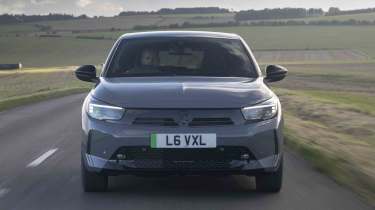
| Pros |
|
| Cons |
|
The Corsa Electric uses a single electric motor to drive the front wheels, much like the regular petrol Corsa. Both power outputs feel similarly nippy around town due to having a responsive accelerator pedal, which is typical of an EV. The near-instant torque from the electric motor makes the 0-30mph dash very swift despite the 1544kg kerbweight.
It’s a fine car around town, with light and reasonably precise steering helping to boost agility in built-up areas and around roundabouts, the typical roads this car will spend its life on. Grip is also decent, and thanks to the heavy battery pack keeping the weight low in the car, the Corsa Electric doesn’t lean too much in the bends and doesn’t feel out of place on a twisty country road. It’s safe and predictable rather than outright fun. For that, you’ll need to go for an MG4, because its rear-wheel-drive setup and extra power afford much more adjustability to the driving experience.
The ride is smooth enough for the most part. The extra weight and slightly stiffer suspension compared with the normal petrol and hybrid Corsa models means it starts to feel a little lumpy over poor road surfaces. On the motorway, the Corsa Electric cruises with relatively low levels of road noise. There is a little bit of wind noise over the chunky door mirrors and some electric motor whine, though.
The Corsa Electric’s two-stage regenerative braking system works well, with the ‘B’ setting providing a decent amount of stopping power when you lift off the throttle. It’s more intuitive than it sounds, and with enough anticipation, you can slow enough for roundabouts without needing to use the brakes.
0-62mph acceleration and top speed
With the electric Corsa, you can choose between two power outputs, ranging from 134bhp to 154bhp. We say that, but the power output does vary depending on which drive mode you’re in as a way of boosting your efficiency and overall driving range. For example, if you’re in the 134bhp version and stick with the car’s default Normal mode, you have 108bhp on tap; only when you toggle the selector switch into Sport do you get the car’s full 134bhp. Conversely, switch to Eco, and you’re restricted to 81bhp and have a much softer response to throttle pedal inputs in order to eek out a few more miles for every kilowatt of electricity you use.
According to Vauxhall, when Sport mode is engaged, both the 134bhp and 154bhp versions of the Corsa Electric will do 0-62mph in 8.2 seconds. That’s very nippy for a supermini, but the entry-level MG4 is quicker still, managing the same 0-62mph dash in 7.7 seconds, while the 148bhp version of the Renault 5 completes the same acceleration run in 7.9 seconds.
The strong surge of acceleration in the Corsa Electric starts to tail off once you get up to motorway speeds, but you’ll find that’s the case in most of the electric Corsa’s rivals.
“The Corsa Electric isn’t quite as agile as its petrol-powered counterparts, and the light steering still doesn’t offer much in the way of precision or feedback. On the other hand, its ride is a little less bouncy at speed.” – Alex Ingram, Chief reviewer
| Model | Power | 0-62mph | Top speed |
| You 50kWh 136 | 134bhp | 8.2s | 93mph |
| Design 51kWh 156 | 154bhp | 8.2s | 93mph |
Range, charging and running costs
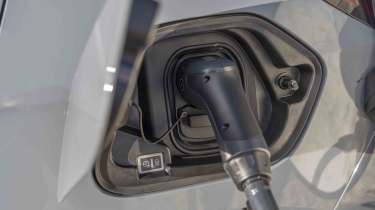
| Pros |
|
| Cons |
|
Electric range, battery life and charge time
This is where you’d hope the Corsa Electric scores well, and in many respects, it does. The chunky 50kWh (47kWh usable) battery under the floor isn’t bad in a car of this size and packs enough juice for an official range of 221 miles – about the same as an entry-level MG4 offers.
It’s worth noting that the slightly larger 51kWh (48kWh usable) battery boosts the electric supermini’s official WLTP range up to 266 miles in Design trim, although that can’t match the Extended Range MG4 with its much larger 77kWh (74.4kWh usable) battery and up to 323 miles of range.
As far as rapid charging goes, the Corsa Electric’s 100kW maximum charging speed is somewhere around the middle of the pack – certainly better than the 50kW the Fiat 500 maxes out at, but not quite as fast as the 150kW you can reach in the MG4. Both the 50 and 51kWh models have the same quoted charge times, so a 10-80% top-up from a suitably fast rapid charger will take 30 minutes, while a standard 7.4kW home wallbox will take just under eight hours to fully recharge each battery pack from flat.
Those who are tech-savvy can get somewhat of a bargain with the 50kWh Yes trim Corsa, which starts at around £27,500. That saves around £1,500 (at the time of writing) compared with the Design trim, which starts at just over £29,000. Even with the discount, that’s still about £4.5k more expensive than our preferred 99bhp 1.2 petrol Corsa in mid-range GS trim. Thankfully, the electric version is in a lower Benefit-in-Kind (BiK) company car tax rate and avoids the luxury car tax penalty for models costing over £40,000 when new. Like all EVs, the Corsa Electric is no longer exempt from VED road tax, but you can still avoid playing ULEZ, at least until December 2025.
The Corsa Electric’s insurance ratings range from group 26 to group 30 (the latter, oddly, being the cheapest Yes trim, while the former is for the priciest 51kWh version in Ultimate trim) are similar to the MG4, which also starts in group 27 – although the hottest 435bhp XPOWER version does fall into group 40. Both are a lot higher than the Renault 5, which starts in group 18 and only goes as high as group 22.
The Corsa Electric is predicted to shed its value at quite an alarming rate. It’ll only retain between 31 to 35 per cent of its value over three years and 36,000 miles, with the best being the 50kWh Yes trim, and the worst being the 51kWh GS model. Both the BYD Dolphin and Renault 5 do much better, with the 5 maintaining around 50 per cent of its value over the same period, while the Dolphin maintains around 46 per cent of its original value.
Longer PCP deals have been created for those looking to buy on finance to help soften the blow of this steep depreciation curve, but that’s still quite a large drop in value to have to take on the chin.
To get an accurate valuation for a specific model, check out our free car valuation tool...
| Model | Battery size | Range | Insurance group |
| Design 50kWh 136 | 50kWh (47kWh useable) | 221 miles | 28 |
| Design 51kWh 156 | 51kWh (48kWh useable) | 266 miles | 30 |
Interior, design and technology
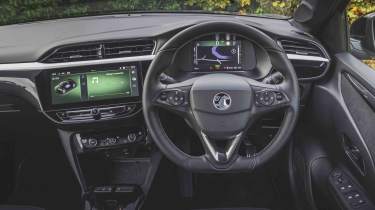
| Pros |
|
| Cons |
|
There isn’t much visual difference between the petrol Corsa and the Corsa Electric. One has an exhaust pipe, and the other has a plug socket under the fuel filler flap and a small ‘e’ badge on the tailgate – ideal for those not keen on standing out.
The straightforward interior layout of the Corsa Electric gives you little clue as to the car’s powertrain. The only giveaway is that a seven-inch digital driver’s display replaces the conventional dials used in other Corsa models. Some will like how simple the cabin is, but in our opinion, it’s a shame there’s not at least a little more flair, something the E-208, which the Corsa Electric shares its platform with, has in spades.
Sat-nav, stereo and infotainment
As standard, you get a 10-inch touchscreen packed with features, but it can sometimes feel a bit slow to respond. It is fairly straightforward to navigate, making it easier to live with than the rather fiddly menu layout used in the MG4. However, it’s no match for the Google-based infotainment system used by the Renault 5, which has a much clearer layout, speedier response times, and the ability to use Google’s voice recognition software to program in navigation destinations.
All Corsa Electric trim levels have Apple CarPlay and Android Auto smartphone connectivity. The mid-tier GS adds a satellite navigation system and a wireless smartphone charging pad. A six-speaker sound system is standard across the range and cannot be upgraded.
You can view your remaining range, schedule charging times, and remotely precondition the cabin temperature via an app.
“There are five colours to choose from on Yes trim, and six with the rest of the Corsa Electric range. Carbon black is the free one, which is a little disappointing when its Peugeot E-208 counterpart is available for free in a vibrant yellow.” – Max Adams, Online reviews editor
Boot space & practicality

| Pros |
|
| Cons |
|
The regular Vauxhall Corsa has been designed to accommodate an electric variant from the outset, so there’s little penalty in terms of cabin or boot space compared with the petrol-powered model.
Comfort levels are good, with plenty of seat and wheel adjustment and well-shaped seats. Visibility is obstructed by thick roof pillars and a small back window, which is why opting for mid-range GS is likely a good idea, because this trim comes with front and rear parking sensors, and a reversing camera.
There are plenty of places to stash everyday items like phones and keys, and the door bins are big enough for bottles. The glove box is just as small as it is in the Peugeot E-208, which is a bit annoying if you want to keep valuables out of sight.
There’s seating for five in the Corsa Electric, although adults will have a much easier time in the front than in the back.
Cabin space remains unchanged from the regular Corsa, despite the need to accommodate batteries within the same footprint. That’s good news for those sitting in the front, where the regular Corsa is considered to be pretty spacious. It’s just a shame that taller people in the rear will still find themselves a little more cramped than they would be in an MG4 or BYD Dolphin.
As with the regular petrol Corsa, the rear door opening is small and awkwardly shaped, making it difficult for taller people to get in, and also making it more challenging for parents to install their children in car seats. Two ISOFIX points are mounted on the outer positions of the rear seats, but the Corsa Electric misses out on the additional child seat mounting point that the Renault 5 has on the front passenger seat, making that rival more flexible for families.
Dimensions and size
The Corsa Electric is exactly the same size as the regular combustion-powered Corsa, which means it’s 4,060mm long, 1,765mm wide and 1,433mm tall.
For comparison, the MG4 is 227mm longer, 71mm wider, and 71mm taller.
| Dimensions | |
| Length | 4,060mm |
| Width | 1,745mm (1,960mm inc mirrors) |
| Height | 1,433mm |
| Number of seats | 5 seats |
| Boot space | 267-1,081 litres |
Boot space
The only notable area where the Corsa Electric differs from its petrol counterpart is that it doesn’t have underfloor storage like the petrol Corsa, reducing its total boot capacity from 309 to 267 litres.
Nevertheless, the Corsa Electric still trumps the Fiat 500 electric and MINI Cooper for luggage capacity. The larger MG4 has a negligible 22 litres of additional boot space on the Vauxhall, while the Renault 5 offers nearly 60 litres of additional storage. Few can beat the BYD Dolphin, which has an extra 76 litres of space.
Fold the rear seats down, and you’re left with 1,081 litres of space to play with, just slightly less than the 1,118 litres in the regular Corsa.
“The lack of under boot floor storage means there isn’t anywhere to keep your charging cables beside a bag rolling around the boot floor.” – Max Adams, Online reviews editor
Reliability and safety

| Pros |
|
| Cons |
|
While the Corsa Electric didn’t feature in the most recent 2024 Driver Power owner satisfaction survey, the Vauxhall brand came in a worrying 26th place out of 32 manufacturers – two places lower than the previous 2023 result. Owners liked the low running costs, but didn't have a lot to say about other areas. That's a shame because sibling Peugeot came in sixth, while Citroen did even better, and finished in fifth in the same survey.
There are plenty of standard safety features on board, from driver, passenger, side, and curtain airbags, to preventative systems like automatic emergency braking (AEB), brake assist, forward collision alert and speed sign recognition to help keep you out of trouble in the first place. However, the four-star Euro NCAP crash-test rating (out of a maximum of five) the Corsa received in 2019 is a little disappointing compared to its competition. Its score was penalised due to concerns raised with the rear head restraints and their protection level against whiplash. If safety is your primary concern, then look at newer rivals such as the BYD Dolphin and MG4, which have both been tested under the latest and most stringent testing criteria and received a maximum five-star rating.
| Key standard safety features |
|
| Euro NCAP safety ratings |
|
Buying and owning
Our best buy: Vauxhall Corsa Electric Yes 134bhp 50kWh
Of the four trim levels available, it is the entry-level Yes that makes the most sense financially. It’s usefully cheaper than Design trim, yet it comes with the added benefit of heated front seats and steering wheel. We’d also recommend the 134bhp, 50kWh version over the pricier 51kWh car with 154bhp. The less expensive version feels similarly nippy in urban driving and still provides a decent driving range for the money.
Like every new Vauxhall, the Corsa Electric gets a fairly standard three-year/60,000-mile warranty, which is fairly typical for the class, but falls somewhat shy of the four-year/100,000-mile manufacturer's warranty Renault offers for its electric cars, while MG provides a seven-year/80,000-mile policy.
Every Corsa Electric has a separate eight-year or 100,000-mile battery warranty. If the battery’s usable capacity drops below 70% during that time, Vauxhall will replace it for free.
The Corsa Electric needs an initial service after one year or 8,000 miles, whichever comes soonest, then it’ll need to be serviced every two years or 16,000 miles from that point onwards. That gives electric owners a distinct advantage, as the petrol Corsas require maintenance every 12 months, which inevitably raises your running costs – even with a service plan.
Vauxhall Corsa Electric alternatives
There’s no shortage of competition in the small electric car segment, including the Peugeot E-208 mentioned earlier, which has a more premium feel and significantly sharper looks than the Corsa Electric. And let’s not forget that the E-208 offers just as much range.
Meanwhile, the Fiat 500 and MINI Cooper bring funky, retro-inspired looks and some slick infotainment systems to the proceedings, though being smaller city cars, neither of them can quite match the Corsa Electric’s range or practicality. It’s a similar story with the distinctive-looking Ora 03 (formally known as the Funky Cat) hatchback, which might be better for rear seat room, but has very limited boot space. We also found the 03 lacked a little sophistication in terms of its driving experience.
However, the MG4 and Renault 5 are the Corsa Electric’s strongest rivals. The Renault 5 in Techno trim comes with a range of useful equipment, including a heat pump, adaptive cruise control, a reversing camera, satellite navigation, and wireless phone charging, all of which are standard. If you opt for the Comfort Range version of the R5, it's also quicker than the Corsa Electric.
The MG4 has a broader range of battery capacity options, which means you can get a much larger 64 and 77kWh battery capacities in your MG4, which might be important to those who regularly travel long distances.
Then there’s the BYD Dolphin, which isn’t the most exciting to drive, but it is very well-specified, and its MPV-style body gives it greater practicality than the Corsa Electric.
Latest deals on the Vauxhall Corsa Electric and rivals
Frequently Asked Questions
If you can afford it, we think the Vauxhall Corsa Electric is among the best small electric cars you can buy today, because it does most things well while also providing decent range and charging speeds.
